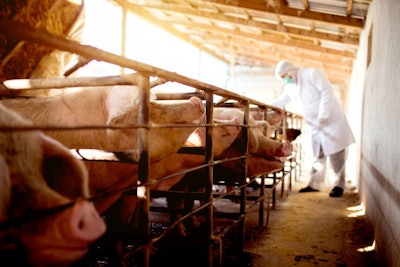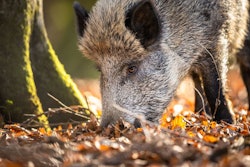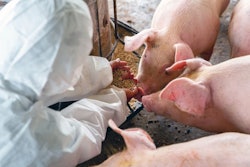
In Japan, the first cases of classical swine fever (CSF) have been recorded for almost 3 months.
Six cases of African swine fever (ASF) in domestic pigs in the Kingdom of Bhutan were officially confirmed in mid-February.
The animals, all of which died, were among 58 village swine in the Dagana district of this South Asian state. This is according to the official notification to the World Organisation for Animal Health (WOAH). Source of the virus is attributed to the following factors: swill feeding, fomites and illegal animal movements.
From the report, the village of Doragaon appears to be close to the country’s southern frontier with India, and near a border crossing point.
During the two months after a previous outbreak of ASF in early November 2022, a total of seven pig herds in two other districts of southern Bhutan were affected by the disease. Directly impacted were more than 6,800 swine on four farms, as well as two backyards and one village herd.
Also in South Asia is Nepal, where more than 2,800 pigs were reported to have died at the end of February. Mortalities occurred at 12 farms in Nepal’s Bharatpur city, according to My Republica. So far, outbreaks have affected four municipalities in the city.
Between March and November 2022, Nepal’s veterinary agency registered 33 ASF outbreaks with WOAH. These occurred across all five of the country’s regions.
Indonesia, Malaysia, Philippines: more ASF in pigs
In Indonesia’s South Sulawesi province, ASF virus has been detected for the first time. Since the start of 2023, almost 600 pigs have been affected, according to the United Nations’ Food and Agriculture Organization (FAO). Its latest update on the ASF situation in Asia is dated March 3. Furthermore, new cases are reported in the province of East Nusa Tenggara.
In Western Malaysia, the number of commercial farms in Penang state affected by ASF has risen to 30. Directly impacted by the disease so far in this state have been more than 68,600 pigs, reported Malaysia Now on February 14. Three new outbreaks had been confirmed since the start of the month, all in districts where previous cases have been reported.
In the Philippines, new outbreaks of ASF are reported by the Philippine News Agency (PNA) in the Central Visayas region. At the end of February, this source recorded the first cases of the disease in the province of Capiz. Blood samples taken from backyard animals tested positive for the ASF virus. All pigs within 500 meters of the outbreak were culled, while provincial authorities raise awareness about the disease threat with local consumers and hog raisers.
Meanwhile, the ASF threat continues in the Western Visayas province of Iloilo, according to the same source. On February 21, PNA reported that the virus had been detected in 104 communities in 17 of the province’s 22 local government units.
At the start of this month, PNA reports, pig blood samples taken in Carcar City have tested positive for the virus. This city is in the island province of Cebu, which is part of the Central Visayas region.
Following this result, nearby areas such as Negros Occidental province and Bacalod City in Western Visayas have added Cebu to the areas from which imports of live pigs and pork products are banned. PNA reports that the ban will be in effect until mid-April.
So far this year, cases of ASF have been found in 13 provinces of Vietnam, according to the FAO. However, the number of outbreaks in the country is well below that recorded at this time last year.
ASF situation stable in Hong Kong
At the start of February, first cases of ASF were reported in Hong Kong since May 2022. The affected premises was a licensed farm in the Sheung Shui district in the New Territories.
Recent updates indicate that the outbreak involved a total of 107 pigs there, 62 of which have been culled. So far, no further outbreaks have been reported in Hong Kong.
More wild boar cases in Russia’s Far East, Singapore, South Korea
After a nine-month hiatus, ASF has been detected again in Primorskiy krai in Russia’s Far Eastern federal district.
According to the WOAH notification, two animals testing positive for the virus were found dead in a natural park in the second week of February. The location appears to be near to the border with China.
Singapore recorded its first ever cases of ASF in wild boar one month ago.
Latest notification to WOAH from the state animal health agency describes the disease situation as “stable.” Up to February 24, a total of nine animals have so far tested positive for ASF at eight locations. There are no pig farms in Singapore, and the keeping of domestic swine by citizens is not permitted.
Since South Korea first registered ASF in August 2021, the number of wild boar testing positive for the virus has reached 2,890. This is according to Pig People on March 6. This is 48 more than reported by the same source on February 13. Infected animals have been found in four provinces.
So far, 32 outbreaks have affected South Korea’s domestic pigs. The most cases were confirmed in mid-February.
View our continuing coverage of the global African swine fever situation.
Japan reports new outbreak of Classical swine fever
At the end of February, Japan’s veterinary authority registered with WOAH one further outbreaks of classical swine fever (CSF) among domestic pigs.
At a farm with around 3,000 pigs in the Kasumigauri city area, elevated mortality was observed. Fourteen of the animals died. A wild-type CSF virus was identified, and the rest of the herd was culled.
At an epidemiologically linked farm in Sosa city, a further 98 pigs were subject to preventative culling.
Kasumingaura city is located in Ibaraki, while Sosa city is in Chiba. Both of these prefectures are in the Kanto region in central Honshu, near to Tokyo.
This brings to 86 the country’s total confirmed CSF outbreaks. Most recent outbreak among farmed pigs was in the Tokyo area in November 2022.
Since the start of 2022, 81 outbreaks of CSF in Japan have been reported to WOAH. These have directly affected 76,442 domestic pigs, as well as 789 wild boar.
No CSF outbreaks were recorded in Japan between December 1992 and September 2018.
Since October 2019, vaccination of domestic pigs against CSF has been allowed in 39 of Japan’s prefectures, including Ibaraki and Chiba. Indeed, vaccination is officially recommended in those areas. In these prefectures, restriction zones are not set up following disease outbreaks.
More on CSF
Like ASF, CSF (hog cholera) is a notifiable disease that affects members of the pig family, according to the WOAH.
Both diseases can cause devastating losses in domestic and wild populations, while not impacting human health. CSF is most commonly transmitted to healthy animals by direct contact from those infected with the virus. It is known that the CSF virus can survive for months in refrigerated pork, and for years in frozen meat.
Despite the similar names, CSF and ASF are caused by unrelated viruses.

















